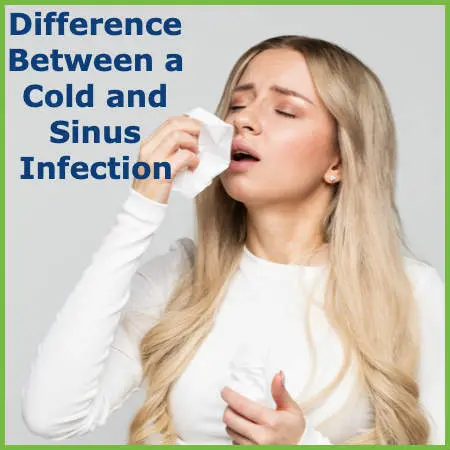
If you’re like the rest of humanity, you’ve probably experienced the common cold. Brought on by a virus, the common cold disappears eventually (typically after 5-10 days), but during that time you may experience a sore throat, cough, headache, mucus buildup, fatigue, sneezing, runny nose, congestion, itchy, watery eyes — the works. People have access to a number of different options when this happens. However, a sinus infection is different. A cold cannot cause a sinus infection, but it can support the conditions that allow a sinus infection to happen.
Your sinuses are the passageways behind your eyes that run through the skull, producing mucus to keep the inside of the nose moist. During a sinus infection — which can be brought on by bacteria, a virus, or even an allergy — the person may experience sinus pressure behind the eyes, a runny nose that lasts more than a week, an ongoing headache caused by the sinus pressure, fever, bad breath, discoloration in the mucus, fatigue, and a loss of smell. For people that smoke or have allergies, chronic sinus infections can be the end result.
Treatment Options
If you have had symptoms lasting only a day or two, you may want to wait as it could be simply allergies. Treatment should be sought if the symptoms are long-lasting, severe and seem to only be getting worse. It’s a good idea to consult a rhinologist like Dr. Kuperan at this time. Whatever might be going on, you want an accurate diagnosis and the ideal treatment plan. There are times when the medication you take simply needs to be stronger; whether it’s stronger antibiotics or steroids. In addition, a CT scan or x-ray, can help clarify for you and for the doctors what might be happening inside your passageways. Sometimes a nasal endoscopy — in which a small camera is placed inside the nose to get a closer look at the inflammation in the sinuses — is the best way to learn more if problems persist, regardless of the medication. When medication is not enough, Dr. Kuperan offers invasive and non-invasive surgery options.
Surgery That Works Best for You
For non-invasive procedures, Dr. Kuperan offers a balloon sinuplasty. This is a type of sinus surgery that uses state of the art technology to guide a balloon device into the passageways to gently open up the drainage pathways. In extreme cases, sinusitis surgery may be the best option. This type of surgery works above the molars to access the sinuses through the mouth.
No matter what you think, do the right thing, and find out from an expert what the best options are for you. If you don’t feel well for more than a few days and are experiencing a combination of the symptoms listed above, contact Dr. Kuperan at Houston Advanced Nose & Sinus to schedule a consultation. He is a board certified Otolaryngologist (Ear, Nose, Throat) specialist and a certified diplomate of the premier University of Miami Miller School of Medicine Rhinology Fellowship.


